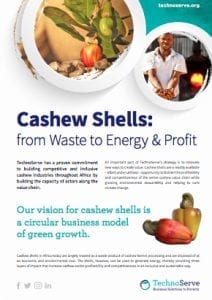While byproducts from processing and manufacturing may seem to be a burden – creating difficult, and often hazardous, waste disposal issues and contamination – resourceful management can turn what is typically treated as garbage into an opportunity for growth and sustainability. By finding alternate uses for byproducts, producers can replace the burden of waste with benefit. Whether it be cashew shells or coffee tree husks, businesses have found creative solutions to get the most out of the resources at hand, while supporting the communities they inhabit.
The Business Case for Cashew Waste
Cashew nuts are an important catalyst for economic growth in sub-Saharan Africa. Africa is now the world’s greatest producer of raw cashew nut, which serves as an important agricultural commodity that significantly contributes to national GDPs. Most of this production is carried out by smallholder farmers and processors, meaning this salty snack is an essential source of income for rural livelihoods.
However, despite the potential to add value to their raw nut product, most cashew nut processing takes place outside of Africa. TechnoServe is working with entrepreneurs across Africa to keep more of their raw nuts’ value within their communities by removing the shells locally, a multi-step process that creates thousands of jobs, often in rural areas.
As massive as the cashew’s potential is for rural and national economies, however, 70% of the raw cashew nut’s weight is regularly thrown away in the form of its shell. Once removed, the shell is typically burned as a rough, dirty, and inefficient fuel, or is discarded as waste.

By throwing out the shells, cashew processors are not only creating a complicated waste-disposal issue, but are also neglecting two potential byproducts: cashew nut shell liquid (CNSL) and the shell’s dried husk. The extracted liquid has several manufacturing uses, such as paints and varnishes, and can be sold to other industries as additional income. With the liquid removed, the dry cashew shell can be used as a more efficient and clean fuel, not only within the processing plant, but also for local communities.
While the business case is different for each country and even each plant – depending on the scale of their operation, electricity and diesel prices, and other factors – TechnoServe teams worked with cashew producers, big and small, to generate the greatest possible impact from their cashew farms and factories.
.jpg)
Coffee Husk Solution
In East Africa, the coffee industry is also converting a waste problem into a benefit for coffee-producing communities. A vital part of coffee processing takes place at a hulling station, a centralized collection center where the coffee bean is separated from its husk layer. Through the hulling process, large amounts of fibrous husks accumulate, which can contaminate local waterways and create a serious safety hazard.
In Agaro, Ethiopia, the Nasir Mohammed hulling station felt the consequences of this problem when their husk waste caught fire, burning down the warehouse and all their machinery. But now, the hulling station has turned its husk processing problem into a coffee production solution.
Courtesy of Techno Serve


